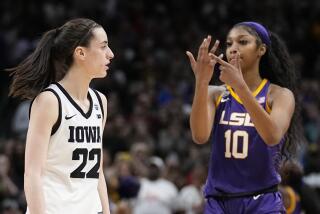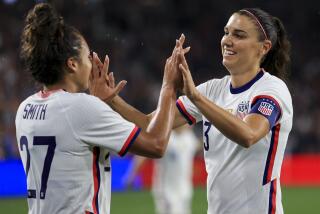Prep Voices
- Share via
Nobody’s perfect.
Years ago, our sports heroes were admired solely for what they accomplished on the playing field. Sure, they had foibles and faults--just like their modern counterparts--but we were usually kept in the dark about their off-field exploits.
What used to be considered the private part of an athlete’s life--perhaps kept that way through a gentlemen’s agreement between player and reporter--is today made public as competing newspapers, magazines, TV and radio stations vie for the “exclusive” story.
Athletes aren’t the only ones who undergo such scrutiny; anybody who stands in the public spotlight must accept being held to a higher standard by admirers.
In a TV commercial, basketball superstar Charles Barkley said he didn’t want to be a role model. Olympic silver medalist figure skater Nancy Kerrigan echoed Sir Charles’ sentiments during a TV interview not long ago.
But many professional and amateur athletes are looked up to by young people hungry to find someone to emulate. Is it fair to expect any athlete to serve as a role model?
It might not be fair to expect anybody to serve as a role model. But young people will continue to look up to someone, to hang on their every word and, perhaps, to copy their behavior. And that’s always going to come with the territory of being a star.
Athletes Have No Special Obligation
John Chow, Cypress Junior: NO
Who’s to say that an athlete has an obligation to serve as a role model? Where do the actual role models lie?
It’s not fair to expect an athlete to serve as a role model. Athletes should not have to watch every little move they make.
They already have enough worries on and off the field. They need to worry about their jobs and their families.
When an athlete such as Charles Barkley goes out and performs, he is getting paid to play. He is not getting paid to be a role model. Barkley should be able to act just like any normal person. He should not have to put on a facade and change his personality because he is in the public eye.
Just because a person is in the public eye doesn’t mean he should be expected to serve as a role model. There are many people in the public eye whom we don’t expect to be role models. Why is it athletes seem to shoulder this obligation?
When an athlete is considered a role model, it should be based solely upon his athletic ability, not his personality, his habits or his attitude. The athlete’s only job is to perform up to his capabilities. If he unleashes his playing repertoire in front of millions of people and some of the million want to emulate him because of his abilities, then that’s fine. But an athlete should not have to change his lifestyle to accommodate his fans.
If an athlete chooses not to be a role model, it is his prerogative. If he chooses not to be a role model, he obviously knows his fan support might diminish. Diminishing fan support means a lack of endorsements, which in turn means less money. If an athlete is willing to make this sacrifice, then obviously he knows what he wants.
I wholeheartedly believe it is the parents who should be designated role models, not athletes. After all, parents influence their children from birth.
If the parents can make a profound impact on their children, they will know what to look for in a role model. Parents are the ones who should shoulder the responsibility. If parents neglect their children, then they are obviously not being role models.
Is it fair to let a negligent parent abandon his responsibility and put the burden to serve as a role model on a person whom their child doesn’t even personally know? Come on, get real.
More to Read
Go beyond the scoreboard
Get the latest on L.A.'s teams in the daily Sports Report newsletter.
You may occasionally receive promotional content from the Los Angeles Times.






